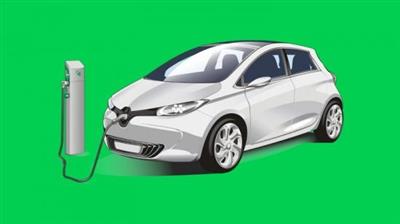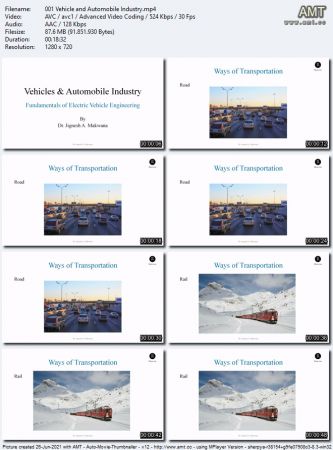MP4 | Video: h264, 1280x720 | Audio: AAC, 44.1 KHz, 2 Ch
Genre: eLearning | Language: English + srt | Duration: 27 lectures (5h 20m) | Size: 1 GB
Learn fundamentals of electric vehicle system with multidisciplinary prospective
What you'll learn:
Fundamentals of Electric Vehicle System
Average Motor Power Calculations
Driving Cycle
Torque Speed Characteristic of Vehicle
Mathematical Modeling of Vehicle
Simulations & Analysis of Vehicle Model with MATLAB
Electric Motor Drive System
Requirements
This is beginner course but it covers engineering aspects of electric vehicle system. Thus basic mathematics including differential equations and fundamental concepts of science (12+) is required to get fully benefited from this course.
Description
The world is changing, and the automobile industry is adopting electric vehicle systems much faster than ever before. The electric vehicle system achieved a lot in the last decade and now it is on track to fulfil the goal of a green transportation system with efficient and sustainable energy sources.
The total number of electric cars worldwide had only 0.02 million in 2010 which is increased to more than 7 million in 2020. Imagine the same growth rate for the decade 2020-2030, and then one can realize the real future of the electric vehicle market worldwide.
Electric Vehicle Engineering requires multidisciplinary expertise like electrical, mechanical, automobile, power electronics, electronics & communication, and computer engineers.
This course is designed on fundamental engineering aspects of the electric vehicle system that must be known and understood by each team member irrespective of their branch. The main aim of this course is to explain basic requirements, goals, and issues related to electric vehicle system design.
It starts with the history of the automobile and electric vehicle system and leads to every detail one needs to know about the electric vehicle system.
It covers basic calculations required to find various parameters of the Electric Vehicle system like required average motor power, vehicle range, and battery calculations.
It explains the torque-speed characteristic of the vehicle in detail and also covers how to select an electric motor to match the torque-speed characteristics of the vehicle.
It covers detail about driving cycles, vehicle parameters, dynamic equations, electric motors, drive train, energy source, different EV configurations, and more.
It also includes the development of the MATLAB simulation model and its analysis to understand the effect of various parameters on the vehicle.
It includes detail about all types of energy sources like battery, fuel cell, ultracapacitor, and flywheel.
This course explains the role of engineers of various disciplines to achieve a common goal in terms of performance requirements of the electric vehicle system. This course is suitable for engineering students of any branch who wish to work with electric vehicle industries in the future.
This course will be helpful to research scholars who want to start their research work in the field of electric vehicle engineering.
Who this course is for
This course is suitable to engineering & science students of all branches from first year to final year.
This course is suitable to all EV enthusiastic who want to understand the engineering aspects of electric vehicle system in detail.
Download link:Kod:rapidgator_net: https://rapidgator.net/file/f2f5245bf8ef6289dc4dd5ad3ec91153/7nb5s.Fundamentals.of.Electric.Vehicle.Engineering.part1.rar.html https://rapidgator.net/file/a1e8d8117d5cbc1eba2de49e4cca9fa9/7nb5s.Fundamentals.of.Electric.Vehicle.Engineering.part2.rar.html nitroflare_com: https://nitroflare.com/view/1423F9940AF0842/7nb5s.Fundamentals.of.Electric.Vehicle.Engineering.part1.rar https://nitroflare.com/view/B9BFCD4D1581935/7nb5s.Fundamentals.of.Electric.Vehicle.Engineering.part2.rarLinks are Interchangeable - No Password - Single Extraction
1 sonuçtan 1 ile 1 arası
-
26.06.2021 #1Üye



- Üyelik tarihi
- 20.08.2016
- Mesajlar
- 144.947
- Konular
- 0
- Bölümü
- Bilgisayar
- Cinsiyet
- Kadın
- Tecrübe Puanı
- 153
Fundamentals of Electric Vehicle Engineering
Konu Bilgileri
Users Browsing this Thread
Şu an 1 kullanıcı var. (0 üye ve 1 konuk)



 LinkBack URL
LinkBack URL About LinkBacks
About LinkBacks






 Alıntı
Alıntı
Konuyu Favori Sayfanıza Ekleyin